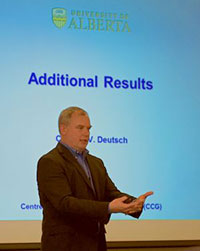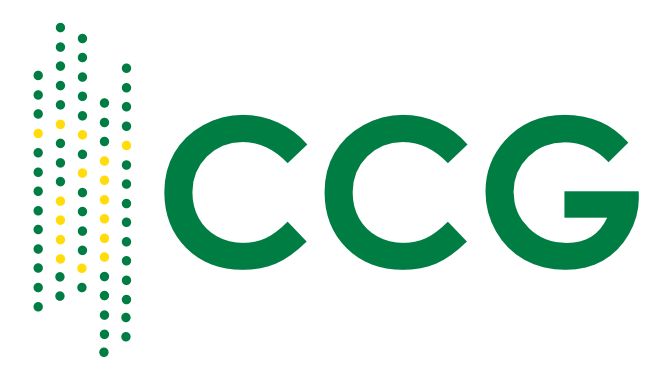About the Centre for Computational Geostatistics

Clayton V. Deutsch
The Centre for Computational Geostatistics (CCG) is a research program at the University of Alberta that operates similar to other industrial affiliates programs and joint industry programs at different universities. The CCG was launched with the vision of becoming a leader in the education of geostatisticians and the delivery of geostatistical tools for modeling heterogeneity and uncertainty. The CCG currently consists of about 32 supporting companies, three full time staff, and about 16 graduate students.
The Faculty associated with CCG are committed to placing all inventions in the public domain with preferential access to sponsors. The CCG provides a mechanism for industry to contribute to and sustain geostatistical research and teaching, which is of long term interest to many companies. The CCG is organized and administered by Professors Clayton V. Deutsch and Jeff Boisvert with a focus toward academic objectives. Overarching principles include (1) openness in research, (2) enrichment of the student experience, (3) promotion of the University as a credible academic institution, and (4) in accordance with the University of Alberta vision, inspiration of all CCG affiliated students to outstanding achievements in learning, discovery, and citizenship.
The main objective of CCG is to support the mutual needs of industry and academia in research and education. The benefits to industry include the opportunity to influence geostatistical research and education, interaction with students as potential employees, early access to publications and access to faculty members for discussions and presentations. The benefits to the university include funding for tuition and living allowances, input on current problems of interest, student exposure to industry needs, and availability of summer internships.
Background
The Centre for Computational Geostatistics (CCG) was founded at the University of Alberta in Edmonton, Alberta, Canada in 1998.
While the structure of CCG has evolved in the last fourteen years, the principles and focus remain unchanged. The CCG is an applied research group and industry consortium focused on setting the benchmark for geostatistical modeling practice and pushing the leading edge of the field through prolific high-quality research developments. The number of graduate students and members that comprise the CCG has been steadily growing since establishment in 1999. The background of the people and companies affiliated with the CCG has maintained a steady balance between mining, petroleum, and environmental engineering and geoscience. The focus of the CCG is on developing the practice of geostatistics through teaching and applied research. The target is to produce practitioners, researchers, and research results that are recognized internationally and across related disciplines as being of the highest quality and standard.
Vision
To be the unquestioned leader in the education of geostatistical practitioners and the development of geostatistical tools.
Teaching highly qualified personnel and developing methodologies with software tools remains the core of what the CCG is all about. Our vision is to be the undisputed international leader in these two activities. Persistent unrelenting pursuit of excellence in teaching, research and applications will make this vision a reality. Our vision is that there will be dozens of groups around the world that focus on geostatistics. When people give a list of those schools, the CCG at the University of Alberta will be listed at the top of that list. Many of these schools will trace their roots back to the CCG. The focus is on practitioners; CCG will be recognized for influencing the practice of geospatial modeling.
Mission
To teach and prepare people to build high quality geostatistical models that realistically reflect natural heterogeneity and accurately measure our uncertainty.
The fundamental principles of constructing numerical spatial models will be taught and implemented. Techniques will be incrementally improved. Breakthrough technologies will be sought and pursued. Patterns of natural heterogeneity are complex and rich in detail; geostatistical tools that realistically reflect those patterns lead to improved decisions. An important goal of modern geomodeling is to quantify the uncertainty at unsampled locations. There is a unique truth. We calculate a probabilistic model of uncertainty. The calculated probabilities at specific locations will be verified by experimental proportions as they become available, for example, 80% of the true values will be found within the P90 and P10 values. Global uncertainty is an ephemeral notion at best, but we will provide repeatable documented tools for providing global uncertainty estimates.
Strategy
-
Deliver classes to undergraduate students, graduate students, and professionals in industry.
-
Explore interesting research ideas in a variety of subject areas and aspects of heterogeneity and uncertainty modeling.
-
Complete relevant projects for industry.
There is great benefit for everyone in academia, industry and government to be exposed to teaching of centuries-old fundamental principles, the foundational principles of geostatistics, and the tradecraft details that have evolved in recent applications. Teaching will be aimed at students of all ages and backgrounds. A wide ranging portfolio of research topics will be actively pursued. Some of these research topics will be a direct result of industry collaboration and other topics will be the spontaneous follow-up related to the combined strengths of the supervisors and students of the research program. Completing industry projects will keep our focus on real problems and maintain practical relevance of our work.
Core Values
- Understanding geostatistical methods is a foundational catalyst for influencing individuals and groups to appreciate variability and uncertainty and make improved decisions.
- Mentoring colleagues in the theory and application of geostatistics and related technical disciplines is important.
- Recognizing and adhering to professional codes of conduct is a requirement of all geostatistical researchers and practitioners.
- Resources must be managed carefully to ensure that equipment is available to researchers and students have the opportunity to remain financially solvent.
- Strategic opportunities are recognized and realized.
- Recognition of individual and group achievement is worthwhile.
- Excellence and professionalism should be the goal of all students, researchers and leaders involved in geostatistics.
Learn more about the CCG on the following pages:
